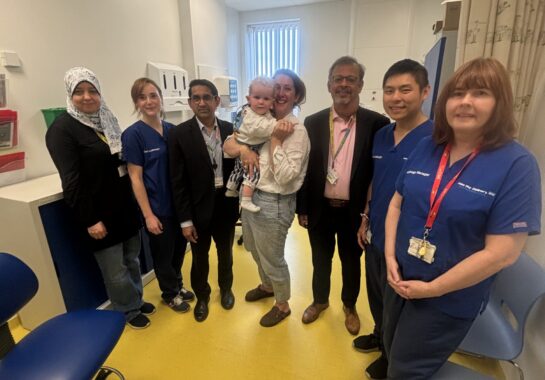Alder Hey Children’s NHS Foundation Trust has recently launched the first vestibular screening programme (VIS-L) for infants in the UK.
The vestibular system, located deep within the inner ear, is a tiny but crucial organ that plays a central role in balance, movement and spatial awareness. It also influences cognitive functions, regulates muscle tone, controls eye movements, modulates heart rate and respiration, and serves as the body’s internal GPS navigation system. A malfunctioning vestibular system impacts daily activities in many ways.
While newborn hearing screening is routinely offered in the UK to detect hearing problems, vestibular problems often go unnoticed unless the child is closely assessed by specialists. Objective vestibular tests especially for infants and toddlers require special skill sets, knowledge and dedicated technology which are now available at Alder Hey.
Professor Soumit Dasgupta, Consultant Audiovestibular Physician and Clinical Lead has been a clinician at Alder Hey for 11 years.
He said: “A child’s ability to process balance and spatial information is linked to their overall development. If there is a vestibular problem, children with undiagnosed vestibular issues may struggle with reading, writing, and focusing due to difficulty sitting still or maintaining balance. It has a knock-on effect and can lead to problems like poor coordination, dizziness, or fatigue and there is an increased risk of falls and injuries. They withdraw from childhood play and activities that are crucial for their development. Early detection is key to preventing injuries and supporting physical and cognitive development through targeted interventions. Vestibular issues in children can also be a symptom of other underlying health conditions too, like neurological disorders. Screening can help detect such conditions early on.”
Vestibular screening is a relatively quick assessment that uses three important tests and cutting-edge technology to check if a child’s vestibular system is working properly. It helps identify issues that may affect a child’s balance, attention, learning and coordination.
The new vestibular screening clinic will see infants who have been diagnosed with permanent hearing loss and who have been referred through the neonatal hearing screening programme. Children with hearing losses are at an increased risk for vestibular issues with around a third to half of children with hearing loss, also diagnosed with vestibular weakness.
One and a half year old Dylan is one of the first patients to be seen by the team. Dylan has a genetic condition called Pendred syndrome, which typically causes hearing loss and sometimes thyroid problems and balance issues. Dylan is deaf and has recently received cochlear implants which help him access sound and speech.
“We were excited when we found out about the new programme. Dylan struggles to walk without a helping hand at the moment and as parents we always want to learn as much as possible about Dylan’s condition so that we can help him as best we can. Ultimately it will help give him the same opportunities as other children his age. It’s amazing that we have this new clinic now in the UK never mind on our doorstep.”
Rhiannon, Dylan’s mum
The screening, done between six months and two years old, uses new technology called the cVEMP test (cervical Vestibular Evoked Myogenic Potential). This test checks saccular function (part of the inner ear that helps in sensing gravity that is crucial to balance and spatial awareness) and indicates how well the child moves and carries out physical tasks. It also uses a special state of the art video head impulse test to see how the balance system semicircular canals (essential for sensing movement) in the ear work during movement. The screening further checks basic balance reflexes that usually go away by six months; if they don’t, it might mean there’s a balance problem.
The service began to see its first patients in May. This will be the third VIS programme in the world after Flanders Belgium and Stockholm Sweden but the first to have three mechanisms to the test, which allows for increased accuracy. Alder Hey, along with the team in Flanders, hopes other hospitals across the world will now follow suit. The team has also developed a vestibular rehabilitation package to treat vestibular weaknesses identified through the screen for successful intervention.
Professor Soumit Dasgupta said: “We are delighted that Alder Hey is pioneering the way in paediatric vestibular medicine. After so many years here, trying to increase the quality of life of our children and young people with vestibular issues and hearing loss, it gives me great personal satisfaction to introduce this service which may be life-changing for many. It is vindication of my intense effort to make this happen supported by an incredible and dedicated VIS L team comprising of Sudhira Ratnayake, John Wong, Annie McMahon, Julia Mercer, Maureen O’Hare and Safaa Dawabah. We hope to pioneer this programme across the world.”
